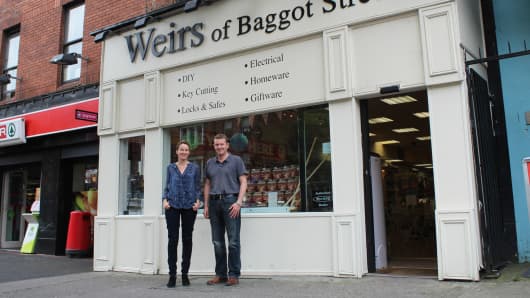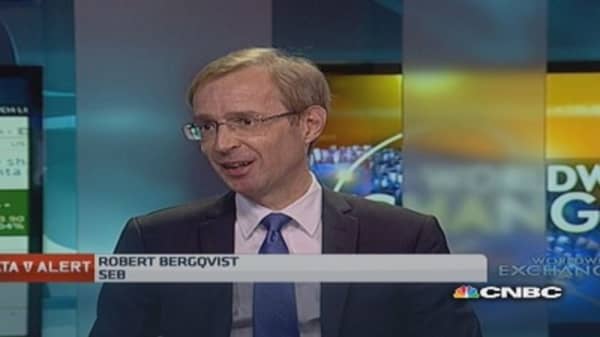"The banks have been appalling," said Maeve Plower. "We've had to give personal guarantees (for credit lines) and we've funded our expansion through income from the business."
Small business owners from Dublin to County Mayo echo the same complaint. Ireland is not going to get its economy back on track, they say, by letting bankers hoard cash while they nurse their battered books back to health.
Read More Medtronic's $43B Covidien deal—and Irish tax move
For their part, bankers say they're eager to lend—but first they have to finish restructuring the bad debts that are clogging up the credit pipeline.
"Credit conditions have tightened here—there's no doubt about that," said Oliver Mangan, chief economist at Allied Irish Bank, one of the few lenders left standing after the bottom fell out in 2008. "The banks, having lost so much money, are far more cautious. And so are the regulators standing over them."
More than five years after the global financial collapse laid ruin to the country's banking system, Ireland's bankers are still working through an epic pile of bad loans.
Ireland is not alone. Across much of Europe, a severe small business lending drought has cut off the capital small businesses need to fund expansion and create new jobs. In Ireland, small businesses employ some 7 in 10 workers.
But many of those businesses are already struggling to pay down existing debts—let alone borrow more money to expand.
Ireland's government is also saddled with a public debt load of roughly 120 percent of gross domestic product—up from 25 percent in 2008. That includes $90 billion for bank bailouts. Huge public and private debt are also weighing on Portugal, Spain, Greece and Italy, where debt surged to an average 106 percentage points of GDP between early 2006 and a peak in 2013, according to a report earlier this month by Standard & Poor's.
The process of paring down debt "has barely begun," according to S&P, and is likely to hold back economic recovery for years.
Ireland's heavy reliance on small business for growth and employment means its recovery will take longer, according to a new paper from the International Monetary Fund
To try to jump-start growth, Europe's central bankers recently began charging banks to hoard cash by imposing "negative" interest rates. The ECB is also pondering a scheme to help small businesses bypass banks by creating loans backed by bonds sold to private investors.
Read MoreDraghi breaks new ground with negative interest rate
So far, the ECB's efforts to thaw the credit freeze have been slowed by political infighting and a much weaker charter than the U.S. Federal Reserve, which moved much more quickly and forcefully to heal the wounds to its credit system.
"(The ECB) is a central bank for 18 different countries," said Mangan. "And Germany, for its part, is very wary of the fact that it might become the paymaster for the rest of Europe. If they put the money in to recapitalize the banks and it's gone down the tubes, they won't get it back again."





